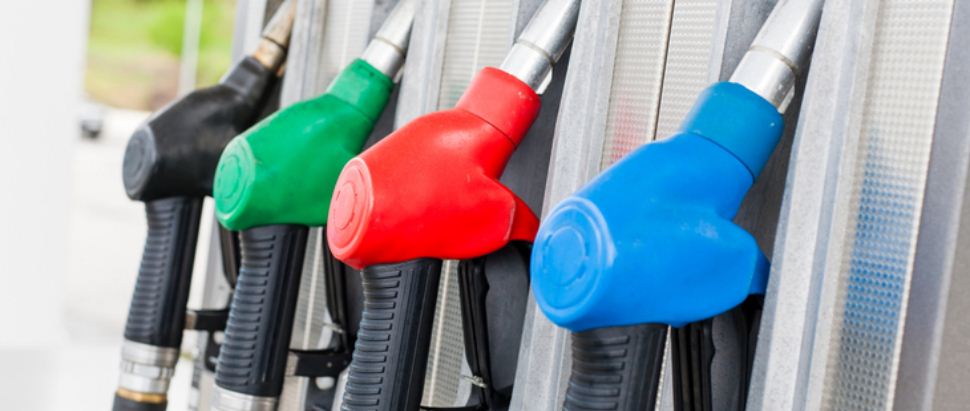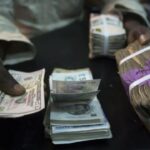
On Monday, the Nigerian National Petroleum Company Limited initiated the unloading of 240 million litres of Premium Motor Spirit, commonly known as petrol, intensifying efforts to alleviate the nationwide petrol scarcity.
As the NNPCL commenced the petrol offloading, fuel stations across different regions were observed selling the product at an average price of ₦800 per litre.
Information gathered by one of our correspondents indicates that the 240 million litres of petrol imported into the country arrived via five vessels, which were then offloaded into five depots on Monday.
Ayo Cardoso, the South-West Regional Coordinator of the Nigerian Midstream and Downstream Petroleum Regulatory Authority, confirmed this during an interview on Monday.
It was reported on Monday that despite claims by the NNPC that the logistic issues causing fuel scarcity had been addressed, Nigerians in Lagos and other parts of the country still struggled to get fuel as many filling stations remained shut.
It was gathered that the situation might worsen in Lagos and other parts of the South-West because there was a directive by the NNPC that fuel trucks must first service the Federal Capital Territory before any other places.
According to oil sector sources, hundreds of trucks loaded were sent to Abuja on Sunday based on the NNPC directive.
Nigerians who went to filling stations across the country on Monday observed that many outlets hiked their pump prices, selling a litre of petrol between ₦650 and over ₦1,000.
As the stations increased the pump prices of fuel, it was learnt that black marketers also used the opportunity to make brisk business, selling a litre of petrol at prices of over ₦1,200/litre, depending on the location and the bargaining strength of the buyer.
It was also observed that the hardship being encountered as a result of fuel scarcity worsened on Monday. The queues in filling stations became longer as work resumed across the nation for the new week.
The fuel scarcity also coincided with the resumption of public schools in some states, adding to the burden on parents, teachers and school owners.
Speaking with news correspondents, the Nigerian Midstream and Downstream Petroleum Regulatory Authority regional coordinator said the agency was doing its best to ensure Nigerians were not exploited by filling stations.
“We are doing something about the fuel crisis; very soon it will be over. Vessels are discharging as I am talking to you. What we are concentrating on is to push the NNPC, which is the supplier of last resort, to make sure they wet the entire populace.
“So, we have about five vessels already discharging the product, about 240 million litres are being discharged as I am talking to you right now. We are working round the clock.
“But then, once you have a problem, it takes like one or two weeks to (normalise), but people will keep on panicking, which is not supposed to be. All these kinds of things disrupt the normal way of operations. But with 240 million litres coming in from five vessels discharging to five depots already today, things will get back to normal,” Cardoso assured Nigerians.
SHORTAGE WIDENS ACCROSS THE NATION
Few filling stations dispensing fuel on Monday were crowded by private and commercial drivers, motorcyclists as well as individuals with jerry cans.
The queues were seen in Abuja as well as Lagos, Ogun, Niger, Nasarawa, Gombe and other states.
The Heyden filling station in Iperu Remo, Ogun State sold petrol at N650 per litre on Monday amid fights among buyers who thronged the station from places like Isara, Ode, Ilishan and others.
A young man sighted at the Heyden filling who did not reveal his name, stated, “I came here to buy fuel because we don’t have fuel in our station. I spent hours in the queue despite being an attendant myself. We don’t know why there is no fuel, but we heard that everybody is waiting for May 1 to know if the president would say something about fuel price reduction or not”.
At WB One Oil & Gas in Ogere, the crowd was not much as a result of the price differential between it and Heyden. The filling station sold a litre of petrol at ₦900 as of Monday morning.
The NNPC retail outlet along the Sagamu-Interchange axis was occupied by buyers who wanted to get the product at ₦580/litre.
Selling at ₦670, the As-Sallam filling station near the NNPC also had a long queue. The NIPCO and AP stations near the RCCG Bus Stop did not open for business.
Commuters heading to work, schools, and various destinations in Abeokuta, the Ogun State capital on Monday found themselves stranded due to the effect of the lingering fuel scarcity.
Many bus stops were filled with passengers trying to board vehicles to schools and places of work.
Some students were also sighted trekking home because they could not get cabs on time while those who offered to carry them increased the fare by 70 per cent.
The Total filling station at Toll Gate, along the Lagos-Ibadan Expressway, in Ogere sold petrol for ₦1,200/litre on Monday.
Also, Danco filling station and NNPC at Magboro, Ogun State, sold for N610 and N580 respectively. While others like TAS, Mobil, Osadol, Heyden, Amuf oil, Rainoil, and NIPCO among others were under lock and key.
Black marketers took advantage of the situation to sell the product at exorbitant prices ranging from ₦1,300 to ₦1,800/litre.
Motorists described the situation as pathetic, calling on the government for an urgent intervention to avoid possible implosion.
Our correspondents observed that a litre of fuel at the black market was sold for ₦900/litre in Apapa, while an outlet belonging to Saddeh at Egbe Bus Stop along Ikotun-Ejigbo road, sold for ₦1,000/litre.
The God’s Decision outlet along Governor’s Road in Ikotun Lagos also sold petrol for ₦900/litre on Monday.
In Gombe State, residents frowned at the incessant increment in petroleum prices as fuel sold across the state at ₦900/litre in a few operating filling stations, and ₦1,400 at the black market.
In Makurdi, the Benue State capital, the few filling stations that opened for business sold petrol between ₦750 and ₦850/litre on Monday. Though, there were no long queues at the filling stations.
It was a similar development in Otukpo and Gboko, the two major urban centres in the state, where the cost of transportation had gone up.
The petrol scarcity in Ondo State affected business activities across the state with commercial drivers slightly increasing their fares by 50 per cent. Commuters who could not afford the fares were observed to be trekking a long distance to their various destinations.
While some stations sold petrol for ₦750/litre, others sold at ₦650.
It was gathered that the fuel stations in Akwa Ibom State dispensed fuel between ₦700 and ₦740/litre across the state as of Monday.
In Ilorin, the Kwara State capital, few petrol stations with long queues of vehicles dispensed fuel for as high as ₦1,000/litre on Monday, while the black marketers sold a litre for as high as ₦1,500. The stations included Shafa, NNPC, NIPCO, and Rainoil.
However, commuters decided to trek to their destinations as okada riders charged between ₦500 and ₦2,000, depending on the distance.
Similarly, in Ekiti State, the fuel crisis bit harder on Monday as many car owners resorted to parking their vehicles at home and patronised either commercial cars or bikes.
The queue was long at the NNPC filling station along Iworoko Road which dispensed petrol at N580/litre.
The Ekiti State Council of Nigeria Union of Journalists, at their monthly congress, called on the state government to urgently intervene.
The NUJ, in a communiqué issued at the end of the congress, called for an investigation of the cause of the scarcity, queues and high prices “with a view to punishing those engaging in sharp practices to the detriment of the citizens.”
In the same vein, fuel stations in Niger State hiked the pump price of the product following the scarcity of fuel.
The price of fuel was stable and there were no queues at the filling stations until Sunday when retailers got information that the price of the product in neighbouring FCT was high and motorists could not get fuel.
The stations were said to have created an artificial scarcity and also hiked the price of petrol.
The black marketers were also sighted hawking the product for ₦1,100 and above.
NIGERIAN MIDSTREAM AND DOWNSTREAM REGULATORY AUTHORITY REACTS
Meanwhile, the NMDPRA regional coordinator, Cardoso told news correspondents that the agency could no longer regulate prices, saying PMS was deregulated following the removal of subsidy by President Bola Tinubu on May 29, 2023.
“For now, the price is based on supply and demand, but we are still going out to make sure that people are not exploiting consumers.
“My people are on the field; they are going round. So, if you see any specific one you think we should handle, you can let us know. But since morning, we’ve been on the field, including myself, making sure nobody is hoarding. You know once there is enough supply, all those things will be a thing of the past.
“We don’t handle price anymore; it is deregulated since the subsidy has been removed. What we do is that there is a price bound that we are monitoring. The person who can determine the price is the person who is supplying marketers, and that is the NNPCL. Once the NNPCL says this is what they are selling, we just expect that there will be some margin around the NNPCL figure and it should not be too excessive,” Cardoso said.
He further said, “If the NNPCL is selling at ₦580, we don’t expect anybody to sell more than ₦630 or ₦650 at worst. If you let us know those selling at ₦700 or ₦800, we will take action. But you have to know that this is happening because there is scarcity. Outside scarcity, those things will come down. We can’t use the current prices to judge what the normal price should be.
“Any station we get to, and we see hoarding, we will ask them to start selling and they have to sell at the official NNPC price.”
‘DONT STORE FUEL’
Meanwhile, Nigerians have been warned to stop hoarding fuel in their houses to avoid a fire outbreak.
“We want to tell everybody that they should be patient, things will get cleared very soon. We have quite enough fuel being discharged. We want to enjoin people not to store fuel at home because of the safety issues around it.
“This is a flammable product, and you cannot guarantee how to handle it if you store it in your house. People should not store petroleum products at home. There will be enough fuel very soon,” Cardoso stated.
Also, the Commissioner for Environment in Ogun State, Ola Oresanya, warned against storing fuel at home.
Oresanya advised, “It is all about safety matters. We should not be tempted to store fuel. PMS is a very volatile material and there is no second chance when it comes to the safety of lives and properties.
“So, it is better for us to endure the pains of the discomfort at the moment. Discomfort is better than loss of lives. We just want to implore our people to make sure that they don’t store fuel in the house. We should please avoid hoarding fuel to avoid any form of domestic or industrial accident”.
Kwara task force
The Kwara State Government Task Force on Monday raided some filling stations within the Ilorin metropolis, cautioning them against hoarding of fuel.
The government said the raid was part of the government’s measures to address fuel scarcity in the state.
In a statement, the Deputy Chief Press Secretary, Government House Ilorin, Mashood Agboola, noted that the committee was set up by Governor AbdulRahman AbdulRazaq to see to the problem of fuel shortage.
“As a responsible and responsive government, we cannot be folding our hands watching. We have to see that the majority of our people enjoy the dividends of democracy,” the leader of the task force and Chief of Staff at Government House, Mahe Abdulkadir, told reporters during the exercise.
Abdulkadir called on the people of the state to be patient and avoid panic-buying.
“We want to call on the people of the state to be patient and avoid panic buying. The Federal Government is not trying to increase the prices of fuel. We will make sure our people are not shortchanged,” he added.
This came as the National Association of Nigerian Students threatened to embark on mass action if the Federal Government failed to take immediate steps to address the current fuel crisis in the country.
The students’ body also asked the Group Managing Director of the Nigerian National Petroleum Company Limited, Mr Mele Kyari, to resign if he could not take decisive actions to resolve the fuel crisis.
The association’s Senate President, Babatunde Akinteye, in a statement on Monday, lamented that the fuel scarcity has left many citizens, including students, frustrated and helpless.
The NANS senate president lamented that students are now facing unprecedented challenges as a result of the increase in petrol pump prices and the scarcity of the product.
While demanding immediate action from the NNPCL to resolve the fuel crisis and restore stability, Babatunde said the students would hit the streets in protest if the situation persisted.



